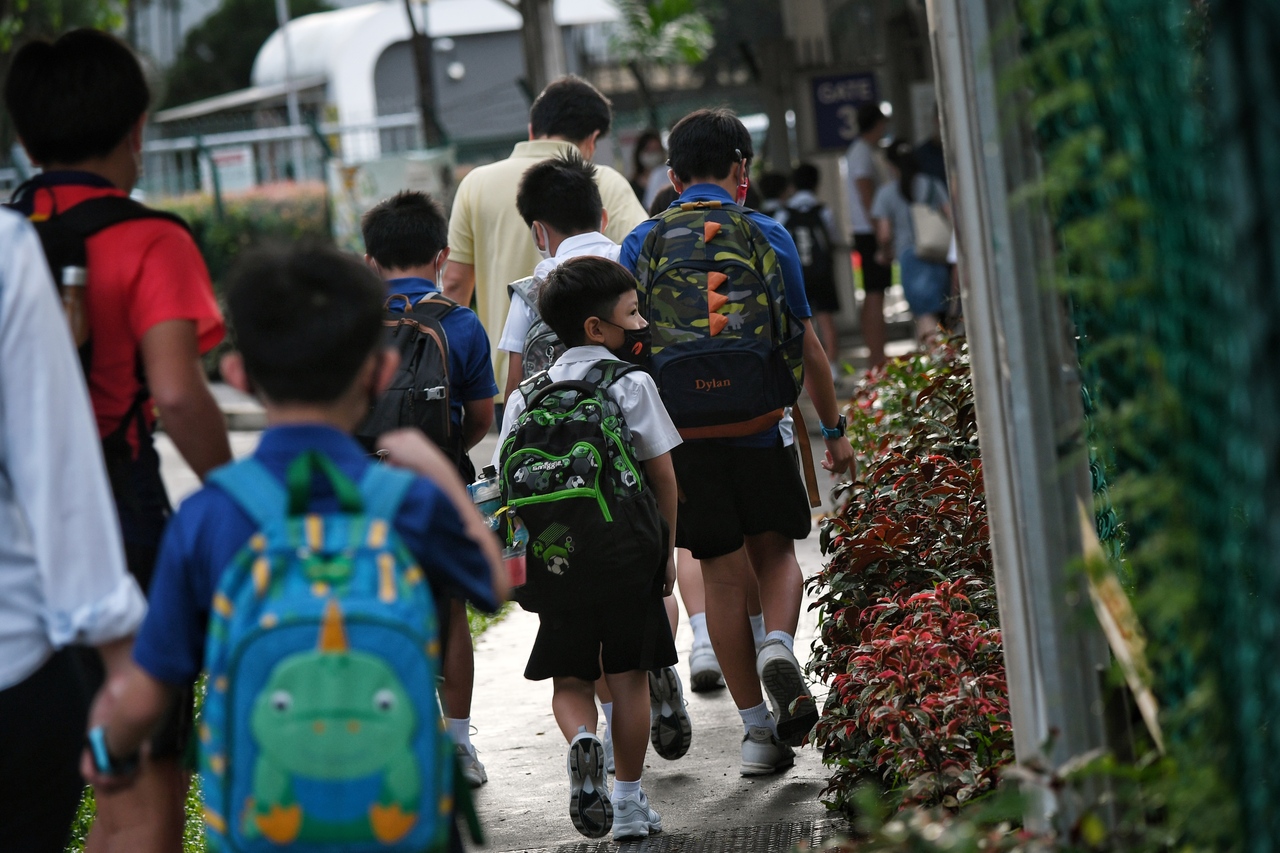Children are not more prone to getting infected with Covid-19: Experts
Sign up now: Get ST's newsletters delivered to your inbox

There is insufficient evidence to conclude that children are now more prone to being infected with the virus.
PHOTO: ST FILE
SINGAPORE - There is little to suggest that the strains of the virus that are currently circulating are more likely to infect children, experts said, even as more than 40 students and pupils from some 30 schools have come down with Covid-19 in the past month.
The reason more children have been infected is due to the cluster environment, such as a tuition centre or a school bus, said infectious diseases expert Paul Tambyah.
Both of these have become the epicentres of two large clusters, said the deputy director of the NUS Yong Loo Lin School of Medicine's Infectious Diseases Translational Research Programme.
The rise in infections includes a cluster at Learning Point tuition centre, which has 28 cases as at Friday (May 21).
On that same day, Singapore also reported its first incidence of school-based transmission.
However, current evidence also does not point to children being more likely to be infected with the B1617 variant than with the original strain.
Official data from the Press Trust of India news agency suggests that the proportion of children infected during the first and second waves of the pandemic in India is similar, Professor Tambyah added.
Associate Professor Sylvie Alonso, co-director of the same programme at NUS, said that more aggressive testing among the younger age group could also be a reason that more cases have surfaced.
"We seem to also see that the B1617 variant is overall more transmissible than the previous variants - across all age groups - hence affecting more children as well," Prof Alonso added.
Associate Professor Hsu Li Yang, vice-dean of global health at the NUS' Saw Swee Hock School of Public Health, said that the risk of severe disease for those under the age of 18 is much lower than for adults.
"Babies under one and children with underlying medical conditions such as diabetes and chronic lung disease may be more likely to get severe Covid-19, but generally those under the age of 18 are far less likely to get severe Covid-19 compared with adults," he said.
There is, however, a very rare and serious condition, known as multi-system inflammatory syndrome - a condition where different body parts can become inflamed - that is seen only in children and is associated with Covid-19 infection, but Singapore has yet to see a case, Prof Hsu added.
Children under the age of 12 are also less likely to get infected, Prof Hsu said.
Still, children remain a weak link in Singapore's fight against Covid-19.
Young children tend not to be able to wear masks or observe safe distancing measures well, Prof Hsu said.
"So, even though they are individually less at risk of serious illness or spreading the virus, collectively, the risk will add up - particularly at tuition centres and other enrichment classes and play locations, where children from multiple schools typically congregate," he said.
Prof Alonso said children who are infected can also be carriers and transmitters of the virus without realising it, because they will be mostly asymptomatic.
She added that this will be a concern if they transmit the virus to vulnerable people in their household who could develop a severe form of the disease.
Prof Tambyah said: "Hence, the idea of vaccinating this age group is a way to protect the vulnerable."
The Health Sciences Authority on Tuesday extended its authorisation for those aged 12 to 15 to receive the Pfizer-BioNTech vaccine. The Health Ministry and Education Ministry will announce when vaccinations will be extended to this age group in due course.
How kids in other nations are faring
More children have been infected in the second and subsequent waves of the coronavirus in some countries. However, most countries do not keep national data about children infected with Covid-19. Instead, these figures are usually kept by individual states and provinces.
United States
Collating state data, the American Academy of Paediatrics said that as at May 13, more than 3.9 million child Covid-19 cases were reported. This is 14 per cent of all cases.
Between 0.1 per cent and 1.9 per cent of all child cases resulted in hospitalisation.
Children accounted for less than 0.21 per cent of all Covid-19 deaths. About 140 children under four have died.
The United States last week vaccinated 600,000 teens between 12 and 15 years old with the Pfizer-BioNTech vaccine.
Britain
Since January, about 12 to 15 children aged eight to 14 have been hospitalised every week for post-Covid-19 complications called paediatric inflammatory multisystem syndrome (Pims), official statistics say.
These complications show up as cough, rashes, fever, low blood pressure and abdominal pain.
Studies show that 47 per cent of those with Pims - a rare but extreme immune response - were of Afro-Caribbean origin and 28 per cent were of Asian origin.
Brazil
The Health Ministry said 832 children under five years old have died of Covid-19. Other reports suggest that 2,060 children under nine have died, including 1,302 babies.
South Korea
Of the total number of Covid-19 cases as at March 24, 4.19 per cent were children below 10 years old, and 6.76 per cent were aged between 10 and 19.
But deaths among children are extremely rare, the government has said.
But deaths among children are extremely rare, the government has said.
Italy
The coronavirus variant first found in Britain is prevalent among Italy's infected children, some experts have warned. They said schools must be reopened with caution.
Israel
More than 50,000 children and teens tested positive in January, more than during the first and second waves of Covid-19 infection, largely because of the more contagious variant first detected in Britain.
The vaccination drive is now expanded to 12- to 15-year-olds.


